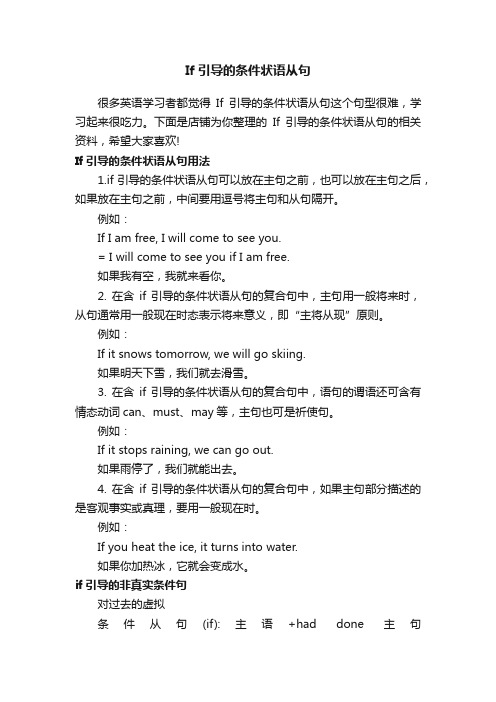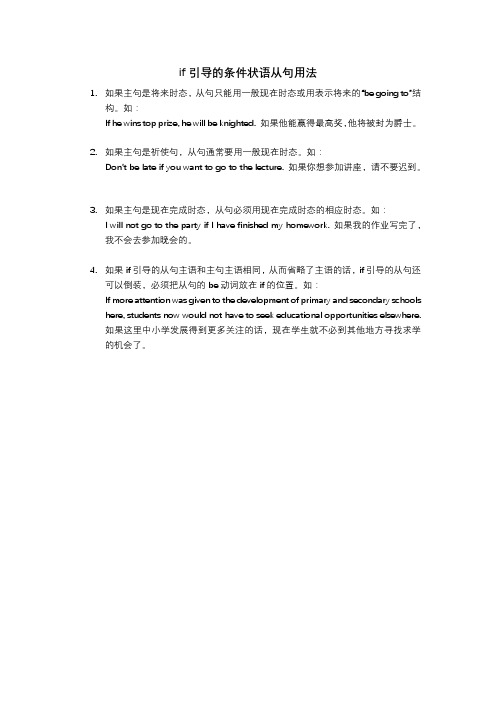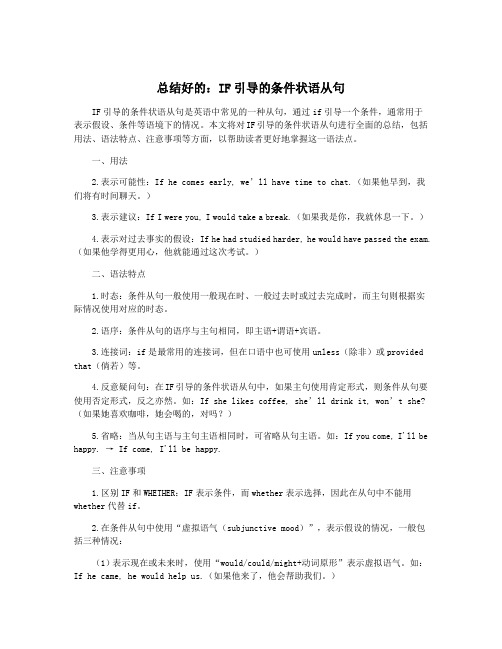If引导条件状语从句的用法
知识点名:if引导的条件状语从句

知识点名:if引导的条件状语从句讲义:if引导的条件状语从句1. if意为“如果”,引导条件状语从句时,既可放在主句前面,也可放在主句后面。
若if条件句放在句首,从句后面常加逗号与主句隔开。
If you go there, I'll go, too.如果你去那儿,我也会去。
My mother will take me to the park if she is free.如果我妈妈有空,她就会带我去公园。
2. 时态运用:在含有if引导的条件状语从句的主从复合句中,主句为下列情形之一的,条件状语从句通常用一般现在时。
(1) 主句是一般将来时,即遵循“主将从现”的原则。
If he comes, he will bring his violin.如果他来,他就会把他的小提琴带来。
(2) 主句是含有情态动词may/might/can/must/should等的句子。
If you want to lose weight, you must eat less bread.如果你想减肥,你必须少吃面包。
(3) 主句是祈使句。
If you are not strong enough, please don't take part in such an activity.如果你不是很健壮,请不要参加这种活动。
3. 句型转换:(1) 借助“祈使句+and/or+陈述句(一般将来时)”这一句型来转换。
其中,在句意上and表示顺承;or表示转折,意为“否则”。
If you work hard, you'll pass the exam easily.=Work hard, and you'll pass the exam easily.努力学习,你将很容易通过考试。
Work hard, or you won't pass the exam easily.努力学习,否则你不会轻易地通过考试。
if状语从句的用法

if状语从句的用法1. if 引导的条件状语从句(真实条件句)用在if引导的条件状语从句中,表示在某种条件下很可能发生时,就是真实条件句,通常从句用一般现在时,主句用将来时态或者情态动词+动词原形或者祈使句的形式。
1 if从句用一般现在时,主句用一般将来时例If he runs he’ll get there in time. 如果他跑的话,他就会及时赶到那儿。
The cat will scratch you if you pull its tail. 如果你拉这只猫的尾巴,它就会抓你。
2 if从句用一般现在时,主句用may/might/can+动词原形例If the fog gets thicker the plane may/might be diverted. 如果雾再大一些,飞机可能就会改在别的机场降落。
If it stops snowing we can go out. 如果雪停了,我们就可以出去。
3 if从句用一般现在时,主句用must/should+动词原形例If you want to lose weight you must/should eat less bread. 如果你想减肥,就必须/应该少吃面包。
4 if从句用一般现在时,主句用一般现在时例If you heat ice it turns to water.(也可用will turn)如果你给冰加热,它就会化成水。
5 if从句用现在进行时,主句用一般将来时例If you are looking for Peter you’ll find him upstairs. 如果你是在找彼得,上楼就会找到他。
6 if从句用现在完成时,主句用一般将来时例If you have finished dinner I’ll ask the waiter for the bill. 如果你吃完了,我就叫服务生来结账。
2. If引导的条件状语从句(虚拟条件句)用表示的内容与现在事实相反,if从句用一般过去时,主句用“would/should/could/might+动词原形”;表示与过去事实相反,if从句用had+动词的过去分词,主句用would/should/could/might+have+动词的过去分词;表示对将来情况的主观推测,if从句用①should+动词原形②were to+动词原形,主句用would/should/could/might+动词原形。
If引导的条件状语从句

If引导的条件状语从句很多英语学习者都觉得If引导的条件状语从句这个句型很难,学习起来很吃力。
下面是店铺为你整理的If引导的条件状语从句的相关资料,希望大家喜欢!If引导的条件状语从句用法1.if引导的条件状语从句可以放在主句之前,也可以放在主句之后,如果放在主句之前,中间要用逗号将主句和从句隔开。
例如:If I am free, I will come to see you.= I will come to see you if I am free.如果我有空,我就来看你。
2. 在含if引导的条件状语从句的复合句中,主句用一般将来时,从句通常用一般现在时态表示将来意义,即“主将从现”原则。
例如:If it snows tomorrow, we will go skiing.如果明天下雪,我们就去滑雪。
3. 在含if引导的条件状语从句的复合句中,语句的谓语还可含有情态动词can、must、may等,主句也可是祈使句。
例如:If it stops raining, we can go out.如果雨停了,我们就能出去。
4. 在含if引导的条件状语从句的复合句中,如果主句部分描述的是客观事实或真理,要用一般现在时。
例如:If you heat the ice, it turns into water.如果你加热冰,它就会变成水。
if引导的非真实条件句对过去的虚拟条件从句(if):主语+had done 主句might/would/should/could+have done对现在的虚拟if+ 主语+动词过去式(be用were)主句might/would/should/could+do对将来的虚拟if+主语+动词过去式(be用were)或主语+should do或主语+were to do主句 might/would/should/could+doe.g.Tom got to the station in time because he started earlier.If Tom had started late, he would have missed the train.Do you think the thief entered through the door?No, if he had, I don't believe, he would have broken the living room window.If the book weren't so expensive, I would buy it.If you didn't live so far away, we would be able to visit you more.What would you do if you lost your passport in a foreign country?Why hasn't he come? If he should not come on time, we would have to put off the trip.2.注意事项e.g.If she hadn't work hard at English in the past, she wouldn't work as well as a secretary in a large company now. 混合时间的虚拟语气从句为对过去的虚拟,主句是现在。
if作为如果的用法

if作为如果的用法"If" 是英语中的一个条件连词,表示“如果”、“假设”或“倘若”等意思。
它主要用于引导条件状语从句,表示某个条件成立时,主句的动作或状态就会发生。
以下是"if" 的一些基本用法:1. 基本形式:if + 条件状语从句,主句。
例如:- If it rains tomorrow, I will take an umbrella.(如果明天下雨,我会带伞。
)- If I have time, I will go to the movie with you.(如果我有时间,我会和你一起去看电影。
)2. 否定形式:if + 条件状语从句,主句+ not。
例如:- If he doesn't study hard, he won't pass the exam.(如果他不努力学习,他就不能通过考试。
)3. 疑问形式:if + 条件状语从句,主句+ 吗?例如:- If she likes dancing, does she go to the dance class?(如果她喜欢跳舞,她去上舞蹈课吗?)4. 短语搭配:- if only:表示对过去事物的愿望或遗憾,意为“要是……就好了”。
例如:- If only I had known about the party earlier.(要是早点知道这个派对就好了。
)- unless:表示除非某个条件成立,否则会发生某个结果。
例如:- Unless you hurry up, you'll be late for the train.(除非你快点,否则你会错过火车。
)- in case:表示以防万一,用于引导目的状语从句。
例如:- Bring an umbrella in case it rains.(以防下雨,带上伞。
)- on condition that:表示在某个条件成立的情况下,才会发生某个动作或状态。
if句型的用法总结英语用法

if句型的用法总结英语用法我们更好地了解if这个英语单词,也更好地掌握它的用法。
以下是店铺为大家整理了if句型的用法,希望能帮助大家更好地掌握if句型,提高英语水平。
if句型的用法1:引导条件状语从句一、if作为连词,引导条件状语从句,它表示的意思是“假如”“如果”等。
在复合句中如果主句用将来时,则if引导的状语从句用一般现在时。
例如:1. If itdoesn’train, we will go to the park next Sunday. 如果天不下雨,下周星期天我们将去公园。
2. If you ask him,he will help you.如果你求他,他将会帮助你。
if句型的用法2:引导让步状语从句二、if还可以引导让步状语从句。
这时if当作“即使是”,“虽说”解。
例如:1. If she’s poor,at least she’s honest. 虽说她很穷,但至少她还是诚实的。
2. I’ll do it, even if it takes me all the afternoon. 虽然会花费我一下午的时间,我还是要做这事。
3. If I am wrong,you are wrong, too. 即使说我错了,那么你也不对。
if句型的用法3:引导时间状语从句三、if引导时间状语从句,当if做“当”或“无论何时”解而不含有条件之义时,if从句中的时态与主句中的时态相同。
例如:1. If youmix yellow and blue,you get green.你将黄色与蓝色混合,便会得到绿色。
2. If she wants the servant,she rings the bell.每当她需要仆人时,她便按铃。
If引导条件状语从句的详细用法解答

If引导条件状语从句的详细用法解答引导条件状语从句最常用的连词是if,常见的if条件状语从句表示在某条件下,某事很可能发生,条件是可能存在的,主句中某种情况发生的概率也是很高的。
如:If you ask him,he will help you.如果你请他帮忙,他会帮你的。
If you fail in the exam,you will let him down.如果你考试不及格,你会让他失望的。
If you have finished the homework,you can go home.如果你作业做完了就可以回家了。
if 条件句的时态搭配1.if从句用一般现在时,主句用一般将来时If he runs he’ll get there in time. 如果他用跑的,他就会及时赶到那儿。
The cat will scratch you if you pull her tail. 如果你拉猫的尾巴,它就会抓你。
2.if从句用一般现在时,主句用may/might/canIf the fog gets thicker the plane may/might be diverted. 如果雾在大一些,飞机可能就会改在别的机场降落。
If it stops snowing we can go out. 如果雪停了,我们就可以出去。
3.if从句用一般现在时,主句用must/shouldIf you want to lose weight you must/should eat less bread. 如果你想减肥,你必须少吃面包。
4.if从句用一般现在时,主句用一般现在时If you heat ice it turns to water. (也可用will turn)如果把冰加热,它就会化成水。
5.if从句用现在进行时,主句用一般将来时If you are looking for Peter you’ll find him upstairs. 如果你是在找彼得,上楼就会找到他。
if引导的条件状语从句用法

if引导的条件状语从句用法
1.如果主句是将来时态,从句只能用一般现在时态或用表示将来的“be going to”结
构。
如:
If he wins top prize, he will be knighted. 如果他能赢得最高奖,他将被封为爵士。
2.如果主句是祈使句,从句通常要用一般现在时态。
如:
Don’t be late if you want to go to the lecture. 如果你想参加讲座,请不要迟到。
3.如果主句是现在完成时态,从句必须用现在完成时态的相应时态。
如:
I will not go to the party if I have finished my homework. 如果我的作业写完了,
我不会去参加晚会的。
4.如果if引导的从句主语和主句主语相同,从而省略了主语的话,if引导的从句还
可以倒装,必须把从句的be动词放在if的位置。
如:
If more attention was given to the development of primary and secondary schools here, students now would not have to seek educational opportunities elsewhere.
如果这里中小学发展得到更多关注的话,现在学生就不必到其他地方寻找求学的机会了。
总结好的:IF引导的条件状语从句

总结好的:IF引导的条件状语从句IF引导的条件状语从句是英语中常见的一种从句,通过if引导一个条件,通常用于表示假设、条件等语境下的情况。
本文将对IF引导的条件状语从句进行全面的总结,包括用法、语法特点、注意事项等方面,以帮助读者更好地掌握这一语法点。
一、用法2.表示可能性:If he comes early, we’ll have time to chat.(如果他早到,我们将有时间聊天。
)3.表示建议:If I were you, I would take a break.(如果我是你,我就休息一下。
)4.表示对过去事实的假设:If he had studied harder, he would have passed the exam.(如果他学得更用心,他就能通过这次考试。
)二、语法特点1.时态:条件从句一般使用一般现在时、一般过去时或过去完成时,而主句则根据实际情况使用对应的时态。
2.语序:条件从句的语序与主句相同,即主语+谓语+宾语。
3.连接词:if是最常用的连接词,但在口语中也可使用unless(除非)或provided that(倘若)等。
4.反意疑问句:在IF引导的条件状语从句中,如果主句使用肯定形式,则条件从句要使用否定形式,反之亦然。
如:If she likes coffee, she’ll drink it, won’t she?(如果她喜欢咖啡,她会喝的,对吗?)5.省略:当从句主语与主句主语相同时,可省略从句主语。
如:If you come, I'll be happy. → If come, I'll be happy.三、注意事项1.区别IF和WHETHER:IF表示条件,而whether表示选择,因此在从句中不能用whether代替if。
2.在条件从句中使用“虚拟语气(subjunctive mood)”,表示假设的情况,一般包括三种情况:(1)表示现在或未来时,使用“would/could/might+动词原形”表示虚拟语气。
- 1、下载文档前请自行甄别文档内容的完整性,平台不提供额外的编辑、内容补充、找答案等附加服务。
- 2、"仅部分预览"的文档,不可在线预览部分如存在完整性等问题,可反馈申请退款(可完整预览的文档不适用该条件!)。
- 3、如文档侵犯您的权益,请联系客服反馈,我们会尽快为您处理(人工客服工作时间:9:00-18:30)。
◆if引导的条件状语从句条件状语从句是在复合句中作条件状语的句子。
表示假如有从句的动作发生就会有主句的动作发生。
条件状语从句常由从属连词if引导。
◆if引导的条件状语从句使用须知:一、位置if引导的条件状语从句,既可放在主句之前也可放在主句之后。
当从句置于主句之前时,常用逗号与主句隔开。
例如:You will catch the bus if you get up early.=If you get up early, you will catch the bus.如果你早起的话,就能赶上公共汽车。
二、时态应遵循主、从句时态呼应的原则。
当主句是一般现在时(包含祈使句和含情态动词can, may, must等的句子),从句也用一般现在时。
例如:You must see the doctor if you are ill.如果你生病了,你必须去看医生。
If you want to go skating, wear warmclothes.如果你想去滑冰,穿上暖和点的衣服。
一.选择正确答案。
1. It was raining heavily___ we got to Paris.A. whileB. ifC. whenD. because2. I don’t know if ___ tomorrow.A. it doesn’t rainB. the rain will stopsC. the rains won’t stopD. it won’t rain3 . The volleyball match will be put off if it___ .A. will rainB. rainsC. rainedD. is raining4. Difficulties are nothing if we ___ not afraid of themA. willB. shallC. areD. do5. We ___ Beijing tomorrow if it doesn’t rain.A. are going toB. wouldC. shallD. will go6. I don’t like to be interrupted if I___ .A. speakB. will speakC. am speakingD. spoke7. If you ___ the book you will understand the story better.A. will be readingB. have readC. will have readD. read8. If you ___ I will go with youA. go toB. wentC. willD. should go9. I’ll go to meet you,if I ___ free then.A. would beB. will beC. amD. was10. If you ___ to the music, buy a CD.A. will listenB. listenC. listeningD. listened11. He suggested ___ a pinic tomorrow.A. to haveB. havingC. haveD. to having12. Be careful, if you ___ want to make mistakes.A. won’tB. don’tC. didn’tD. not13. Work hard if you ___ to get a good mark.A. wantedB. wantingC. wantD. will want14. I want to know if you___ to the party tomorrow.I will if I___ free.A. will come; amB. come; amC. will come; will beD. come; will be15. The cat ___ him___ the hand.A. bit; inB. bited; onC. bit; onD. bited; on16. There is going to ___ a sports meeting next week. If it ___ , we’ll have to cancel it..A. be; will rainB. have; will rainC. be; rainsD. give; is going to rain17. If he ___ , I ___ go swimming alone.A. doesn’t come will goB. won’t come; will goC. will come; won’t goD. is coming; don’t go18. If you ___ a chance to study in a foreign country, just take it.A. gettingB. had gotC. will getD. get19. Frank ___ a film if he’s free next Saturday.A. seeB. sawC. has seenD. will see20. If he ______ exercise, he ___ healthy.A. not; willB. isn’t; won’t beC. doesn’t; will beD. doesn’t do; won’t be21.I don't know if he___ tomorrow.If he ___ ,I'll tell you.A.will come;comes B.comes;comesC.comes;will D.is coming;is coming22.If you _____ to the party, you’ll have a great time.A. will goB. wentC. goD. going23. It will be a long time ____ Peter _____ his work. A. since, has finis hed B. after, finishes C. when, will finish D. before, finishes.24. What will father _____ us from Japan?A. takeB. bringC. carryD. make25. Weifang is famous ______ kites.A. forB. toC. onD. with26.I ____ her the answer if she ____me.A. can tell, will askB. will tell, will askC. would tell, askD. will tell, asks27. –What are you going to do tomorrow?--We’ll go to the library tomorrow if it ____.A. isn’t rainB. rainC. won’t rainD. doesn’t rain28.—Do you know when he will come back tomorrow?--Sorry, I don’t know. When he ____ back, I’ll tell you.A. comesB. will comeC. comeD. may come29. What will you do if you _____ to the old folk’s home visit?A. goB. wentC.goingD. will go30. If I eat ____ food, I’ll be very fat.A. too manyB. many tooC. too muchD. much too31. I’ll give the book to him if he ___ here next Sunday.A. will comeB. comesC. is comingD. came32. There ____an English film in our school tomorrow.A. is going to haveB. will haveC. is going to beD. has33. Could you tell us where ____?A. will the next Olympic Games heldB. the next Olympic Games will be heldC. would the next Olympic Games be heldD. the next Olympic Games would be held34. When my mother returned last night, I ____ a book.A. readB. am readingC. was readingD. am going to read35.What ____ you ____ when it began to rain?A. do, doB. were, doingC. are, doingD. did, do36. I’ll wake yo u up when he ____back.A. willB. is going to comeC. comesD. come二.在正确的答案下划一条线。
1.Daina ( will go/go/goes) to Europe if she (will pass/pass/passes) the ex ams .2. The graduates (will teach/teach/teaches) in the poor village if the Mini stry of Education (will agree/ agree/agrees) soon.3. If there (will be/ are/is) a car accident, they (will call/call/calls) 110 for help at once.4. If it (won’t/don’t/doesn’t/ isn’t) rainy, we (will take/ take/takes) walk out side.5. If a UFO (will land/land/lands) in front of me, I (will go/go/goes) in to look for the alien.6. If he (will have/have/has) money, he (will bulid/build/builds) a science l ab.7.Don’t wait for me if I (am/ will be) late.8.They (won’t/don’t) go to the beach if it (will rain/rain /rains).9. I (will call/ call) you if he (will stay/stay /stays) at home.10. Mr Smith (will let/ let/lets) you know if he (will need/ need/ needs) h elp.11. (Will / Do/ Does) he visit the museum if he (won’t / don’t/ doesn’t) g et tired?12. Where (will/ do/does) they live if they (will miss/ miss/ misses) the b us?三、用所给词的适当形式填空1.If you ________(feel) tired, you _______________ (have) to have a re st.2. Where _______ he _________(see) the film if he ________________ (have) time?3. If there __________(be) fewer trees, there _______________( be) more pollution.4. He _____________(dress) more casually if he ________________( no t work) on weekends.5. If Marcia _____________(live) alone, she ___________________( kee p) a pet parrot.6. Lana ________________( buy) a new dress if the old one _________ ___(be) out of style.7.The twins ______________(fight) if they_______________(argue).8. I ____________(have) a bake sale if I _____________(need) money f or education.9. Peter _____________( send) me a beautiful souvenir if he _________ _______(tour) Spain.10. If Mr Green ___________(say) I am hard- working, my parents ____ _____( feel) glad.11.I ____________(go) to the beach if it________________ ( not rain) th is week.12. __________they __________( have) a match if the P.E. teacher ___ __________(be) busy?13.He ____(write) a letter to his grandparents if he ____(get) his report card this week.14. If she ____________(get) up late, she _____________ ( not catch) t he early bus.15. Peter ________(major) in English if he ____(pass) the exams in Pek ing University.16. Don’t go o ut tomorrow if it ______ _____ (rain) .17. I don’t know if he ___________(come) tomorrow.18. The doctor suggests him ________ ___ (drink) more water.19. I suggested that we ______ _____ (go) swimming tomorrow.20. If you the telephone ______ ___(ring) , answer it.四. 按要求转换句型。
